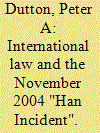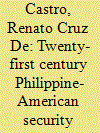|
|
|
Sort Order |
|
|
|
Items / Page
|
|
|
|
|
|
|
| Srl | Item |
| 1 |
ID:
072474


|
|
|
|
|
| Publication |
2006.
|
| Summary/Abstract |
Rejecting the certainty of prediction in favor of a probabilistic approach to forecasting, this paper develops an eight-step forecasting methodology, addressing 1) structural drivers, 2) predetermined elements, 3) critical uncertainties, 4) chance, 5) scenarios, 6) probabilities, 7) signposts, and 8) policy implications, and applies it to the medium-term future of US-China relations. Specifically, it forecasts a 45 percent chance that US-China relations in 2015 will be best characterized overall by a rivals scenario, followed by a 35 percent chance that the US and China will be partners. The chances that the US and China will be allies or enemies are significantly more remote, but real, at 5 percent and 15 percent respectively.
|
|
|
|
|
|
|
|
|
|
|
|
|
|
|
|
| 2 |
ID:
072475


|
|
|
|
|
| Publication |
2006.
|
| Summary/Abstract |
The Ishigaki Strait is an international strait by the terms of the United Nations Law of the Sea Convention, but for national security reasons it is not recognized as such by the Japanese government, which advocates a narrower definition of what constitutes an international strait in which the right of transit passage applies. China, as a traditional land power with tradinationally weak maritime forces, has historically agreed with Japan's limitations on access through such straits. As China's maritime strength grows, it has increasingly greater interest in access to ocean spaces. However, because of tension and poor coordination between its military and foreign policy bureaucracies, China missed an opportunity during the diplomatic crisis in November 2004 to align its position on maritime law with its strategic interests.
|
|
|
|
|
|
|
|
|
|
|
|
|
|
|
|
| 3 |
ID:
072476


|
|
|
|
|
| Publication |
2006.
|
| Summary/Abstract |
This paper examines the changing nature of twenty-first century Philippine-US security relations. It notes that the alliance is against a non-state actor, and raises the possibility that this security arrangement might be difficult to maintain given its prohibitive governance cost and the systemic nature of the threat. It also observes that the alliance has been plagued by dissension between the two countries. In conclusion, the article maintains that these two allies have compelling reasons to revitalize and maintain their security ties. They have also developed forms of cooperation to reduce the alliance's governance costs, iron out their differences, limitations and conflicting interests, and ensure that the partnership will remain functional in the face of new and long-term security challenges posed by international terrorism.
|
|
|
|
|
|
|
|
|
|
|
|
|
|
|
|
| 4 |
ID:
072477


|
|
|
|
|
| Publication |
2006.
|
| Summary/Abstract |
Sometimes called the "Forgotten War" because Americans pay so little attention to it, the Korean War was nevertheless a pivotal event in US foreign policy. Three themes will be integrated into this article as it analyzes Korean War policy. First, the Korean War heightened the debates and divisions among US foreign policymakers. If Japan's 1941 attack on Pearl Harbor helped to silence these divisions, then President Truman's handling of North Korea's 1950 invasion of South Korea helped resurrect them. Second, while foreign policy goals are generally assumed to drive the objectives of war in the classic Clausewitzian sense, the opposite frequently occurred in Korea as changes on the battlefield drove policy objectives of officials in Washington. Third, although the Americans, Chinese and Soviets all worked assiduously to keep the Korean War limited to the Korean Peninsula, the war had repercussions far beyond the Korean battlefield. Its ramifications were felt in Taiwan, Vietnam, Europe and in US defense expenditures as well.
|
|
|
|
|
|
|
|
|
|
|
|
|
|
|
|
|
|
|
|
|